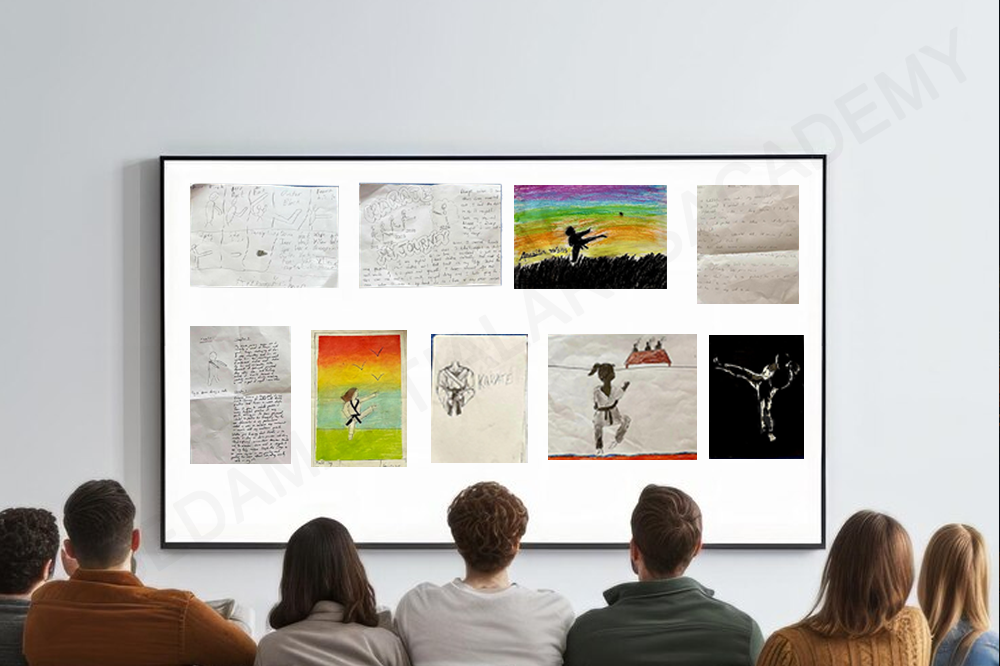Karate is more than just a series of movements; it is a philosophy, a discipline, and a way of life. While our classes often focus on kihon (fundamentals), kata (forms), and kumite (sparring), it is crucial to look beyond these aspects. Fitness, flexibility, mental resilience, and willpower play an equally important role in mastering martial arts. To perfect karate movements or techniques, patience is key which many people lack today. However, with consistency and perseverance, one continues to struggle, learn, and eventually achieve the desired results.
The Role of Patience and Perseverance
Who can learn karate? Theoretically, everyone can. Martial arts are open to all, but not everyone possesses the mindset, willpower, or physical endurance to commit to the practice. The true challenge lies not in starting but in persisting. However, the moment someone steps into the dojo with even the slightest interest, they have already taken the first step. It then becomes our responsibility to guide, support, and motivate them. Yet, without self-motivation, mastery remains out of reach.
Who Can Learn Karate?
Many initially join karate as a hobby. But when they witness its transformative power and how it enhances physical and mental strength they become more invested, turning it into a lifelong pursuit. Of course, it is not for everyone. Some leave when training becomes tough; others may stop due to life circumstances, such as relocation, where they struggle to find an instructor who resonates with them. But as the saying goes, “Where there’s a will, there’s a way.”
The Lifelong Journey of a Martial Artist
During the COVID-19 pandemic, when gyms closed and outdoor exercise seemed impossible, karate continued. Despite limited space, we found creative ways to practice, thanks to online platforms like Zoom and Google Meet. When we first began learning karate, resources like YouTube and Instagram were nonexistent. Today, multiple platforms exist for those eager to learn, making martial arts more accessible than ever. However, karate is not just about physical training, it’s a practice of mental resilience, clarity, focus, and inner strength.
Exploring Karate Beyond Physical Training
To keep our students engaged beyond the physical practice, we introduced activities during our Karate Fest that allowed them to express their understanding of karate without performing techniques. We held a quiz competition, a skit, an art competition, and other creative outlets where students could showcase their interpretations of karate through any medium they preferred. The event was a great success, helping us connect with ourselves beyond karate and through karate.
Karate and Tagore’s Vision of Fearlessness
A highlight of the fest was Sensei Gagan’s inspiring connection between karate and Rabindranath Tagore’s poem Where the Mind is Without Fear. The poem envisions a world where the mind is fearless, knowledge is free, and perseverance leads to perfection principles that deeply embedded in karate.
Where the Mind is Without Fear
By Rabindranath Tagore
Where the mind is without fear and the head is held high;
Where knowledge is free;
Where the world has not been broken up into fragments
By narrow domestic walls;
Where words come out from the depth of truth;
Where tireless striving stretches its arms towards perfection;
Where the clear stream of reason has not lost its way
Into the dreary desert sand of dead habit;
Where the mind is led forward by thee
Into ever-widening thought and action –
Into that heaven of freedom, my Father, let my country awake.
Expressions of Karate Through Creativity
The poem’s themes align perfectly with the spirit of karate:
● “Where the mind is without fear and the head is held high” -In karate, confidence and composure are essential. A true martial artist stands tall, not just physically but mentally.
● “Where knowledge is free”-Karate is not just about techniques; it is about continuous learning, discipline, and applying wisdom in life.
● “Where the world has not been broken up into fragments by narrow domestic walls”-Martial arts unify people beyond race, nationality, or background, promoting respect and camaraderie.
● “Where words come out from the depth of truth”-A martial artist must be honest with themselves and others, maintaining integrity in training and life.
● “Where tireless striving stretches its arms towards perfection”-Every karateka must practice relentlessly, striving for mastery despite challenges.
● “Where the clear stream of reason has not lost its way”-Karate demands clarity, discipline, and wisdom, ensuring techniques are used for growth, not aggression.
● “Where the mind is led forward by thee into ever-widening thought and action”-Martial arts push individuals to expand their physical and mental boundaries, constantly evolving.
● “Into that heaven of freedom, my Father, let my country awake”-Martial arts grant freedom from fear and self-doubt, empowering individuals to walk a path of strength and self-discovery.
During the fest, students expressed their understanding of karate through various creative forms. Some did pastel art, others pencil sketches, doodles, and speeches. A few even performed skits, while the quiz tested knowledge of karate’s history and philosophy. Each expression reaffirmed that karate is not just about fighting techniques but about personal evolution.
Karate: A Path to Mental and Physical Strength
Karate is a way of life, one that builds not just physical strength but mental fortitude. As Tagore envisioned a world free from fear and ignorance, karate, too, shapes individuals into confident, disciplined, and resilient beings. The journey may be tough, but for those who persevere, it becomes a lifelong pursuit of excellence, both on and off the mat.

